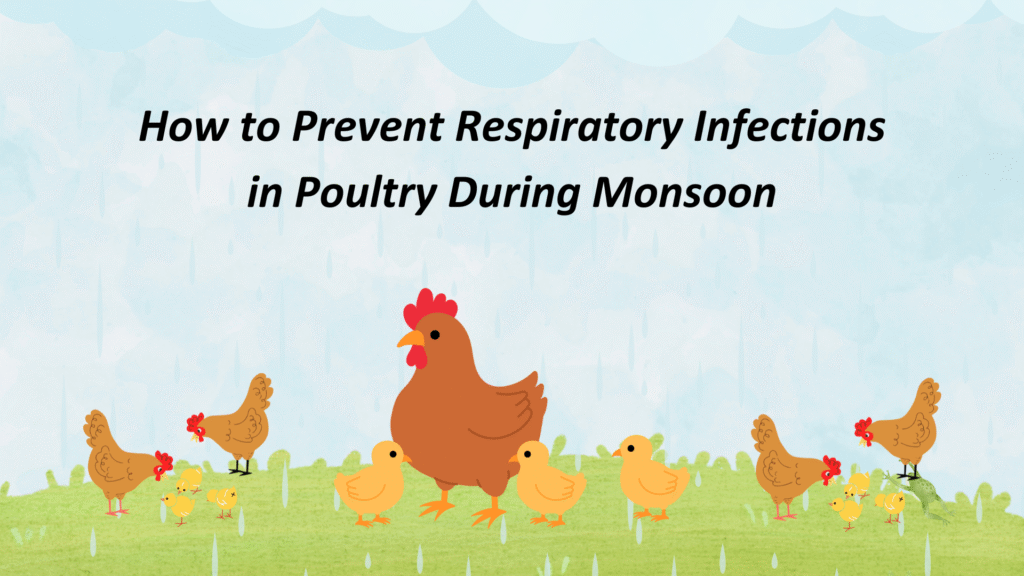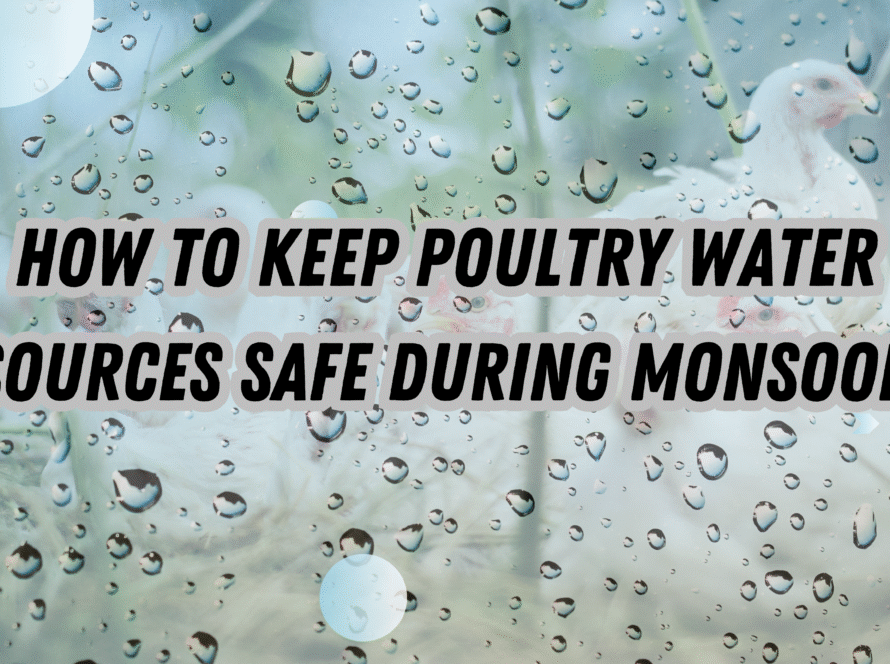
The monsoon season, while essential for replenishing water resources, also brings a number of challenges for poultry farming. The increased humidity, wet conditions, and fluctuating temperatures create an ideal environment for the development of respiratory infections in poultry. These infections can lead to significant losses in terms of both the health of the birds and the economic well-being of the farm. However, with careful management and preventive measures, these risks can be minimized.
Here are effective strategies to prevent respiratory infections in poultry during the monsoon season:
1. Maintain Proper Ventilation
Ventilation is crucial in poultry houses, especially during the monsoon when humidity levels rise. Poor airflow can lead to the buildup of harmful gases such as ammonia and excess moisture, which can trigger respiratory issues in birds.
- Ensure adequate airflow: Keep windows, doors, and ventilation systems open to allow proper air circulations
- Use fans if necessary: Installing fans can help maintain airflow and reduce humidity levels inside the poultry house.
- Regular cleaning of vents: Clean the ventilation systems to prevent the accumulation of dust, debris, and pathogens.
2. Ensure Dry Bedding
During the rainy season, wet bedding can quickly become a breeding ground for bacteria and fungi that contribute to respiratory infections. Keeping bedding dry is essential for the health of your flock.
- Use absorbent bedding materials like wood shavings or rice husk.
- Change bedding frequently and ensure it remains dry, especially during periods of heavy rain.
- Raise the bedding off the ground to prevent it from becoming soggy.
3. Provide Adequate Shelter
Poultry houses should be designed to keep birds dry and protect them from wet conditions. Birds exposed to rain or high humidity can develop weakened immune systems, making them more susceptible to infections.
- Install proper roofing to prevent rainwater from entering the poultry house.
- Build raised platforms to keep birds away from wet floors.
- Ensure that the poultry house is properly insulated to protect birds from sudden changes in temperature.
4. Monitor Temperature and Humidity
The fluctuating temperatures during the monsoon can stress poultry, lowering their immunity and increasing the risk of respiratory diseases. Maintaining a stable temperature and humidity level within the poultry house is critical.
- Install temperature and humidity control systems to keep conditions stable inside the poultry house.
- Use heaters or coolers if necessary to maintain the ideal temperature range for your birds.
- Regularly monitor temperature and humidity levels with the help of a thermometer and hygrometer.
5. Strengthen Immunity with Nutrition
A strong immune system is essential for poultry to fight off respiratory infections. During the monsoon, birds are more susceptible to infections due to the added environmental stress. Providing the right nutrition is key to strengthening their immunity.
- Provide high-quality feed that includes essential vitamins and minerals, particularly vitamin A, D, and E, which play a vital role in immune function.
- Include probiotics in the diet to help improve gut health and strengthen the immune system.
- Ensure access to clean drinking water at all times to prevent dehydration and ensure proper nutrient absorption.
6. Implement Biosecurity Measures
Biosecurity is one of the most effective ways to prevent the spread of infectious diseases. During the monsoon season, it becomes even more crucial to protect your poultry from external threats.
- Limit visitors and vehicles entering the poultry farm to minimize the risk of disease transmission.
- Disinfect all equipment and footwear before entering the poultry house.
- Keep birds away from wild animals and other poultry that may carry diseases.
- Isolate new birds for a quarantine period before introducing them to your existing flock.
7. Regular Health Monitoring
Early detection of respiratory infections is crucial to preventing outbreaks and minimizing the spread of disease. Regular monitoring allows farmers to take action before the situation escalates.
- Observe the birds for signs of respiratory distress, such as coughing, sneezing, nasal discharge, or labored breathing.
- Keep track of overall bird health, including feeding behavior, egg production, and general activity.
- Consult a veterinarian if you notice any symptoms of illness in your flock.
8. Vaccination Programs
Vaccination is a proactive approach to protecting poultry from various respiratory infections. During the monsoon, diseases like Newcastle disease, avian influenza, and infectious bronchitis are more prevalent.
- Consult with a veterinarian to establish a vaccination schedule based on the specific risks in your region.
- Ensure that all birds are vaccinated according to the recommended guidelines for disease prevention.
9. Keep Water Sources Clean
Clean, fresh water is essential for the health of your flock. Contaminated water can introduce harmful bacteria and viruses that can contribute to respiratory infections.
- Change the water regularly to avoid contamination.
- Ensure that water troughs are cleaned frequently to remove algae or any buildup of dirt and bacteria.
- Use disinfectants in water if necessary, but ensure that the concentration is safe for poultry.
10. Provide Stress-Free Environment
Stress weakens the immune system and makes birds more prone to infections. The monsoon season can cause stress due to the wet conditions and changes in temperature. Reducing stress is essential for keeping your poultry healthy.
- Maintain consistent feeding schedules and ensure that your birds have access to clean, dry bedding.
- Avoid sudden changes in temperature or lighting that could cause distress among the flock.
- Ensure that birds have enough space to move around comfortably, preventing overcrowding.
Conclusion
Preventing respiratory infections in poultry during the monsoon season requires proactive measures such as maintaining good ventilation, ensuring dry bedding, providing proper shelter, and strengthening the flock’s immunity. By implementing these strategies, poultry farmers can significantly reduce the risk of respiratory diseases and ensure their birds remain healthy throughout the monsoon. Regular monitoring and attention to detail are key to maintaining a thriving, disease-free poultry farm.


